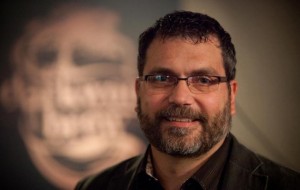 Eric Elnes, Senior Minister of Countryside Community Church (UCC) and host of Darkwood Brew, has recently written several blog posts on Convergence Christianity. His latest post features twelve defining characteristics, which are evenly divided into three categories: Love of God, Love of Neighbor, and Love of Self. Elnes attributes resonate with others, including Brian McLaren, Phyllis Tickle, Frank Schaeffer, and Diana Butler Bass.
Eric Elnes, Senior Minister of Countryside Community Church (UCC) and host of Darkwood Brew, has recently written several blog posts on Convergence Christianity. His latest post features twelve defining characteristics, which are evenly divided into three categories: Love of God, Love of Neighbor, and Love of Self. Elnes attributes resonate with others, including Brian McLaren, Phyllis Tickle, Frank Schaeffer, and Diana Butler Bass.
Love of God
- They are letting go of the notion that their particular faith is the only legitimate one on the planet. They are embracing an understanding that God is greater than our imagination can comprehend (or fence in), and thus they are open to the possibility that God may speak within and across all faith traditions.
- They are letting go of literal and inerrant interpretations of their sacred texts while celebrating the unique treasures that their texts contain. They are embracing a more ancient, prayerful, non-literal approach to these same texts, and finding new insights and resources as they do so.
- They are letting go of the notion that people of faith are called to dominate nature. They are embracing a more organic and reverent understanding of human relationship with the earth.
- They are letting go of empty worship conventions and an overemphasis on doctrines as tools of division and exclusion. They are embracing more diverse, creative, engaging approaches, often making strong use of the arts.
Love of Neighbor
- They are letting go of a narrow definition of sexual orientation and gender identity. They are embracing with increasing confidence an understanding that affirms the dignity and worth of all people.
- They are letting go of an understanding that people of faith should only interest themselves in the “spiritual” well-being of people. They are embracing a more holistic understanding that physical and spiritual well-being are related.
- They are letting go of the desire to impose their particular vision of faith on wider society. They are embracing the notion that their purpose is to make themselves more faithful adherents of their vision of faith.
- They are letting go of the old rivalries between “liberal, moderate, and conservative” branches of their faith. They are embracing a faith that transcends these very definitions.
Love of Self
- They are letting go of notions of the afterlife that are dominated by judgment of “unbelievers.” They are embracing an understanding that, as God’s creations, God is eternally faithful to us, and that all people are loved far more than we can comprehend.
- They are letting go of the notion that faith and science are incompatible. They are embracing the notion that faith and science can serve as allies in the pursuit of truth, and that God values our minds as well as our hearts.
- They are letting go of the notion that one’s work and one’s spiritual path are unrelated. They are embracing an understanding that rest and recreation, prayer and reflection, are as important as work, and that our work is a “calling” and expression of our “sweet spot.”
- They are letting go of old hierarchies that privilege religious leaders over laypeople. They are embracing an understanding that all people have a mission and purpose in life in response to the call of the Holy Spirit. It’s no longer about who wears the robes but who lives the life.
So What?
In our post-Christendom world, America is increasingly pluralistic and religion itself is being redefined. The future of American Christianity is uncertain. After decades of mainline decline, leaders are having substantive intradenominational discussions and proposing real reforms that feature longer term interdenominational and/or postdenominational implications. New opportunities for collaboration, including the development of new networks, are emerging. Convergence Christianity may become a new source of unity among certain groups of Christians.
- Does Convergence Christianity reflect your own understanding at this stage on your journey of faith? Explain why it does or does not.
- What groups do you feel would be most likely to unite around Convergence Christianity (recognizing that they need not shed any current affiliations in order to do so)?
- In a country with tens of thousands of Christian denominations (or groups that function as denominations but choose to use other terms to explain their identity) what have you found to most helpful to the cause of Christian unity? Do you think the next few decades will be marked by greater fragmentation or greater unity? Why?
For Further Reading
- My review of Diana Butler Bass’ Christianity After Religion: The End of the Church and the Birth of a New Spiritual Awakening (2012)
- My review of Jason S. Lantzer’s Mainline Christianity: The Past and Future of America’s Majority Faith (2012)
- The Future Church (v.2020) – 10 Shifts